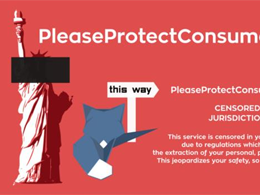
Identity is the antidote for DEXs’ regulation problem
Regulations are coming, and DEXs need to step it up to survive, requiring KYC to weather the upcoming regulatory storm. Regulators from Europe, the United States and elsewhere are busily hammering out details on how to designate decentralized exchanges (DEXs) as “brokers,” transaction agents or similar entities that affect a transfer and cooperate with each other. The U.S. called for multinational cooperation in its executive order on responsible digital asset development, as did the European Union with its recent Financial Stability and Integration Review. And that is just what’s publicly....
Related News
Following the release of the "BitLicense" regulation by the New York Department of Financial Services, ShapeShift.io, an Altcoin and Bitcoin exchange platform has suspended service to all residents of New York State. The Bitcoin and Altcoin exchange now responds to "BitLicense" Regulation and launches a new site dedicated to consumer's protection awareness, PleaseProtectConsumers.org. In response to the new regulation, ShapeShift is redirecting all site traffic from New York to the new initiative: PleaseProtectConsumers.org and inviting other digital currency companies to do the same. The....
ConsenSys, the NYC-based venture production studio, announced yesterday an important partnership with Microsoft, the American multinational technology company, and Blockstack Labs, a venture that is also building blockchain-based software, to create an 'open-source, self-sovereign, blockchain-based identity system'. The companies are joining forces to tackle several identity and reputation problems outlined in the ID2020 conference, the event was held in the New York City branch of the United Nations. According to ConsenSys’s press release UN members, private companies, and government....
A universally compatible Blockchain-based smart identity project by Deloitte has the potential to impact every aspect of our lives. In an era where we are increasingly using mobile and electronic devices to move data around, identity management is still stuck in the era of paper. Crossing borders, being able to drive, getting benefits from the state, all require some form of paper or plastic based identification. Different public and private organizations routinely request identity information from people and companies and often this information has to be given repeatedly even in one day.....
Right now, we lack full control of our data — and it's siloed. But in the months and years ahead, decentralized identities and reputations could change that. Amazing things are being built in Web3 — often by pseudonymous individuals who prefer to keep their real-world identity private.In some ways, this is liberating. It means that anyone can have a chance to get involved in a project and deliver value to the community — irrespective of their background.But as decentralized identities proliferate, there's one issue that cannot be ignored: Ensuring that there's an easy way for us to verify....
As the technology wars heat up in the merchant payment industry, the establishment's foray known as Apple Pay has run into some major identity theft and fraud issues. NFS (Near Field Communications) may be clever. Biometric fingerprint scans into iPhones can make a user feel safe and secure, or just forward the user's information to unknown third parties. At the core of the problem is the weakest link in the Apple Pay chain. The debit card itself. Fraud and Identity Theft quickly join Apple Pay. Apple gets a nice .15% fee for every Apple Pay based on Apple's salesmanship on the idea that....





